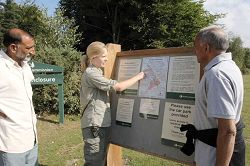Summary
Is social research good for the Forestry Commission?
Summary

Many natural resource management issues have a strong social element. Forest policy and practice therefore need strong studies of social values, benefits, structures and processes. Forest Research interviewed 44 staff members to find out how social research influences all levels of Forestry Commission activity: agenda setting, policy development, implementation and evaluation.
Key findings
- Perceived value of social studies: demonstrating social impact, understanding customers, challenging assumptions about public attitudes and demands, facilitating stakeholder engagement and providing evidence of outcomes for policy, fundraising and partnerships
- Staff members wanted help from social researchers to guide social science methodologies and best research practice, advice on social data gathering, develop longitudinal studies (e.g. in health research) and provide background and insights on latest research findings
- Barriers to social research: time constraints, research outputs too detailed and difficult to read, difficulties translating research findings into real-world practice, lack of relevance to individual job roles and lack of awareness of Forest Research’s expertise
- Most staff members obtain information of social issues through personal contact, internet and e-bulletins/newsletters via email
- Workshops, seminar presentations and informal meetings are the preferred method of receiving research information
- Short research summaries are useful
- Collaboration between Forest Research and Forestry Commission colleagues can increase the visibility of social research
Publications
Funders and partners
Commissioned and funded by the Forestry Commission.
Status
2008-2009
